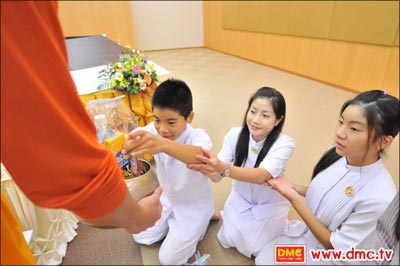Looking after one’s Extended Family
Our blood relatives apart from our immediate family
All of the trees that stand together in the forest will help each other mutually provide shelter against the gales, storms, sun and rain. By offering each other shelter, each tree is protected from being uprooted.
On the other hand the largest tree (the king of the forest) in the forest must endure the strong winds alone and in the end it cannot survive every storm.
In the same way if anyone has sufficient friends and family who can help him in times of need, he is bound bale to overcome all difficulties that cross his path.
Definition of One’s Extended Family
One’s extended family is all of our acquaintances and can be put into two groups:
1. Worldly group. There are two types:
- Our blood relatives apart from our immediate family: e.g. aunts, uncles, cousins, grandparents, etc.
- Our trusted friends: Those we trust and have concern for, i.e. close friends (but maybe not those who are no more than acquaintances or colleagues).
2. Spiritual group. They become our extended family because of the following four reasons:
- They ordain as monks, nuns, novices; love a celibate life
- Study and practice the Dhamma
- They assist in teaching us Dhamma
Create a strong bond in the family.
Finding out who your extended family is
For your extended family, usually the degree of expected commitment is less. You do not see your extended family everyday or have to live with them. Therefore, you have space to breath between visits. It may only be now and then that you have the opportunity to help a member of your extended family or trusted friend, but when you do have the opportunity you have to make a good job of it. Else, it may destroy or make your previously good relationship awkward. Because you have not ‘chosen’ your extended family voluntarily / intentionally, the expectations how much support you can give them is less. It is usually expected to be ‘conditional’, i.e. by giving support something is expected in return. Thus, when we talk of looking after our extended family we mean giving assistance according to the “emotional bank account” (sangahavatthu) on a conditional or ‘one-off’ basis.
Choosing the sort of family to help
1. They make an earnest effort to help themselves first and are not the sort who comes running to you every time there is a minor problem and never think to try to solve their own problem.
2. Those that are of good conduct, grateful, humble, and courte ous. They are not involved with the ‘Roads to Ruin’.
Have a firm foundation that can protect us from groups of bad people.
Appropriate times to help
1. When our extended family falls on hard times and is without refuge.
2. When our extended family needs investment to set them up in life.
3. When our extended family needs to travel but has no made of transportation.
4. When our extended family lacks necessary equipment for pur suing their livelihood.
5. When some of our extended family is ill.
6. When there is some special occasion, e.g. funeral, wedding, or ordination.
7. When someone in our family is unjustly accused of something they did not do.
8. When someone in our family is affected by natural disasters.
Looking after one’s extended family needs caution. It seems simple, but it can be complicated. Some people ignore all their extended family and completely fail in life while some help their family so much that they are in trouble. We need to help our extended family in a proper way.
Set a role model for generations to come.
Emotional Bank Account as the basis of help for one’s family
The purpose of looking after one’s extended family is to maintain harmonious relationships with one’s family. There are four ways in which you can assist your extended family. We called these the Four Bases of Sympathy (sangahavatthu):
1. Helping by offering resources (dana): Giving or lending whatever we can spare which is also useful to our extended family. We should only set aside what’s needed for our family, thus when we share things with them we will not think of a payback.
2. Endearing speech (piyavaca): Speaking in a way that is not at all upsetting to our extended family and also not looking down on them.
3. Lending a helping hand (atthacariya): Hlping our extended family out when they have work to be done. Even if you do not have money to lend, you are still strengthening the bonds of friendship within your extended family by giving them a helping hand.
4. Being consistent to one’s duty (samanatatta): Giving others familiarity and confilence to others and not doing things that create suspicion. You need to conduct yourself in a way befitting your status in the eyes of your extended family.
Spiritual ways to help your extended family
Apart from helping people with material things we can also help people with giving Dhamma teachings. Invite them to make merit by giving, keeping precepts, and meditation.
Make more merit.
Practical tips
Those who look after one’s extended family are blessed; however, they have to do it the right way. Do not allow your assistance for your family to ruin your responsibility and reputation.
The family who receive help must be very careful and thoughtful when asking help from the extended family. If you truly love your family, you should never ask your family to do things incorrectly or unfairly just for your own sake.
Notice that Blessing 11, 12, 13 are about Cherishing our Parents, Raising our Children, and Cherishing our Husband and Wife. However, looking after One’s Extended Family is not Blessing 14. Lord Buddha taught it in Blessing 17 after teaching us on how to earn living (Blessing 14), Generosity (Blessing 15) and Dhamma Practice (Blessing16). The reason behind this is that by following this we will have enough moral in our mind to protect us from our extended family asking us to do unfair things based off of our responsibility to help them.
Create unity in the family.
The Benefits of Looking After One’s Extended Family
1. Have a firm foundation that can protect us from groups of bad people.
2. Have a powerful foundation to expand the business.
3. Make more merit.
4. Create a strong bond in the family.
5. Help the family to come closer.
6. Create unity in the family.
7. Increase loyalty in the family.
8. Establish a large family.
9. Have many relatives in every lifetime.
10. Set a role model for generations to come.
11. Give good environment to the world.
12. Bring World peace.
Any family who can create unity and strong bonds within the family will be respected and be able to protect themselves from all bad people in the same way, a dense grove of bamboo with thorns around it can not be easily cut down. It will grow beautifully like lotuses in a pond, always giving a pleasurable sight to its viewers.
Meditation - Related Articles
" />
" />
" />
" />











